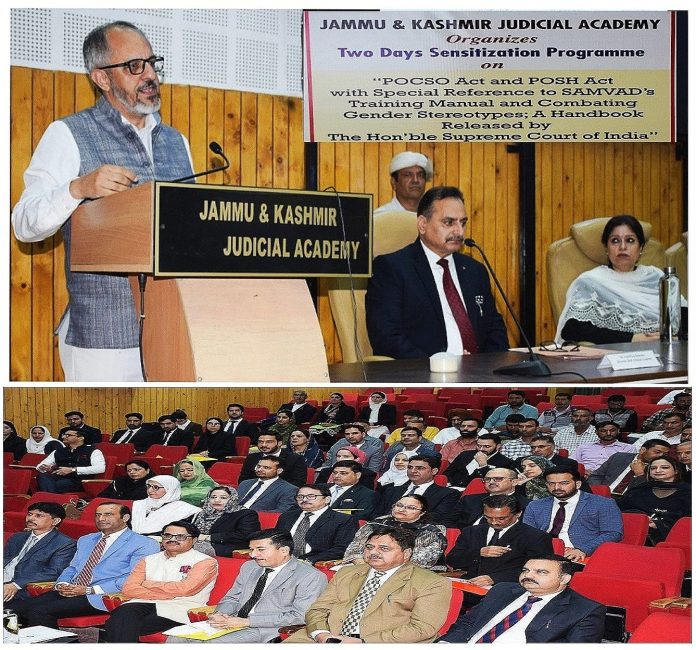SRINAGAR: Two days Sensitization Programme on “POCSO Act and POSH Act with Special Reference to SAMVAD’s Training Manual and Combating Gender Stereotypes; A Handbook released by the Supreme Court of India” for Judicial Officers, Trainee Civil Judges (Jr. Division), SPPs, Medical Officers, officers of Forensic Science laboratory, Officers of Police Department, members of Sexual Harassment Probe Committees, High Court of J&K and Ladakh, and members of Gender Sensitization Internal Committees from all the districts of Kashmir province at J&K Judicial Academy, Mominabad, Srinagar.
The sensitization programme was inaugurated by Justice Rahul Bharti, Judge, High Court of J&K and Ladakh, Member of the Governing Committee for J&K Judicial Academy in the august presence of Justice Moksha Khajuria Kazmi, Chairperson, Sexual Harassment Probe Committee, High Court of J&K and Ladakh (Srinagar Wing) and Member of the Governing Committee for J&K Judicial Academy.
In his inaugural address, Justice Rahul Bharti in his inimitable and eloquent style underlined that bodily integrity and dignity of a female are something which have to be respected at all costs. He emphasised that with the emerging dangers, it was significant to introduce a special legislation which could provide a reliable system for mitigating the number of such offences and punishing the perpetrators.
Justice Bharti highlighted that sincerity, seriousness, sensitivity and sensibility are the four key words that need to be kept in mind 24X7 by all for avoiding the victimisation of the women at any level.
Justice Moksha Khajuria Kazmi in her special address highlighted the importance of good parenting including the importance of teaching our sons the way they should look at a girl rather that dictating what the girl should wear. She stressed upon the need to sensitize the males in our society to have the correctmind-set towards their female counterparts. Justice Kazmi underlined that Gender discrimination based on gender biases and attitudes are a reality for many women and can occur at the workplace in n-number of ways.
Justice Moksha Khajuria Kazmi also underscored that importance of spreading awareness among the women so that they are sensitized about the actions that could be taken against the perpetrators of unwelcome advancements.
Yash Paul Bourney, Director, JKJA welcomed the dignitaries, resource persons including the participants and delivered the introductory remarks. He traced the tapestry of law from the Vishaka vs. State of Rajasthan judgment reported in AIR 1997 SC 3011 to the enactment of POSH Act.
He said that crimes against children have been on the rise since the past decade or more despite all laws. As against the increasing incidents of such diabolic crimes, there has been a corresponding decrease in the conviction rate in such gruesome offences. He remarked that the incidents of sexual harassment are persistent in our society as highlighted by the recent Kolkata Rape and Murder Case of a trainee doctor. He accentuated that we all owe a sense of responsibility and obligation towards the creation of a safe and secure atmosphere at workplace for our woman colleagues and employees.
The first session of the day-1 was chaired by Justice Sonia G. Gokani, first woman Chief Justice (Retired), High Court of Gujarat who explained the objective, nature and contours of the POCSO Act. Her ladyship said that when we deal with child victim, we are dealing with the future of the nation and we need to try relentlessly to protect them.
Justice Gokani quoted Robert Frost and said, “The woods are lovely, dark and deep, but I have promises to keep, And miles to go before I sleep, And miles to go before I sleep.” She highlighted that Child Friendly Court Procedures must be adopted to ensure the best interest of the Child. Her Ladyship also stressed upon the pivotal role played by the soft skills in handling the POCSO matters.
Justice Gokani focused on the salient features of POCSO Act and underlined that Protection of Children from Sexual Offences (POCSO) Act, 2012 makes provisions for avoiding further re-victimisation of the child in the name of the judicial process.
In the second session, Justice Gokani gave a detailed overview on rehabilitation and compensation for Child Victims of Sexual Offences. The learned resource person reiterated that POCSO Act and related frameworks underscores the importance of addressing both the legal and emotional needs of the child.
She also underlined that by focusing on the parameters for determining compensation, balancing justice with child welfare, providing legal and medical aid, and ensuring access to counselling services, the legal system aims to create an environment where child victims can heal, regain their sense of self-esteem and pursue their dreams.
The third session of the programme was conducted by one of the most respected members of the Bar, Z.A. Shah, Sr. Advocate, High Court of J&K and Ladakh. He said that the language of judicial discourse should not reflect antiquated or incorrect ideas about women which inhibits the transformative project of the law and the Constitution scheme of gender justice striving to secure equal rights to all persons, irrespective of their gender.
He further said that language is critical to the life of the law and words are the vehicle through which the values of the law are communicated. He discussed that the Handbook on Combating Gender Stereotypes contains a glossary of gender-unjust terms and suggests alternative words or phrases which may be used while drafting pleadings as well as orders and judgments.
Z. A. Shah stated that government has recently introduced the Protection of Child against Sexual Offences Rules 2020 which takes care of the implementations of the amendments brought in the Act. He underlined that these latest changes bridge the gap and strengthens the interplay between JJ Act and POCSO by utilizing the appropriate authorities cited in Juvenile Justice Act.
All the sessions remained very interactive during which all the participants actively participated and shared their experiences, difficulties and also discussed various aspects of the subject topics. They also raised a number of queries which were answered satisfactorily by the Learned resource persons.


